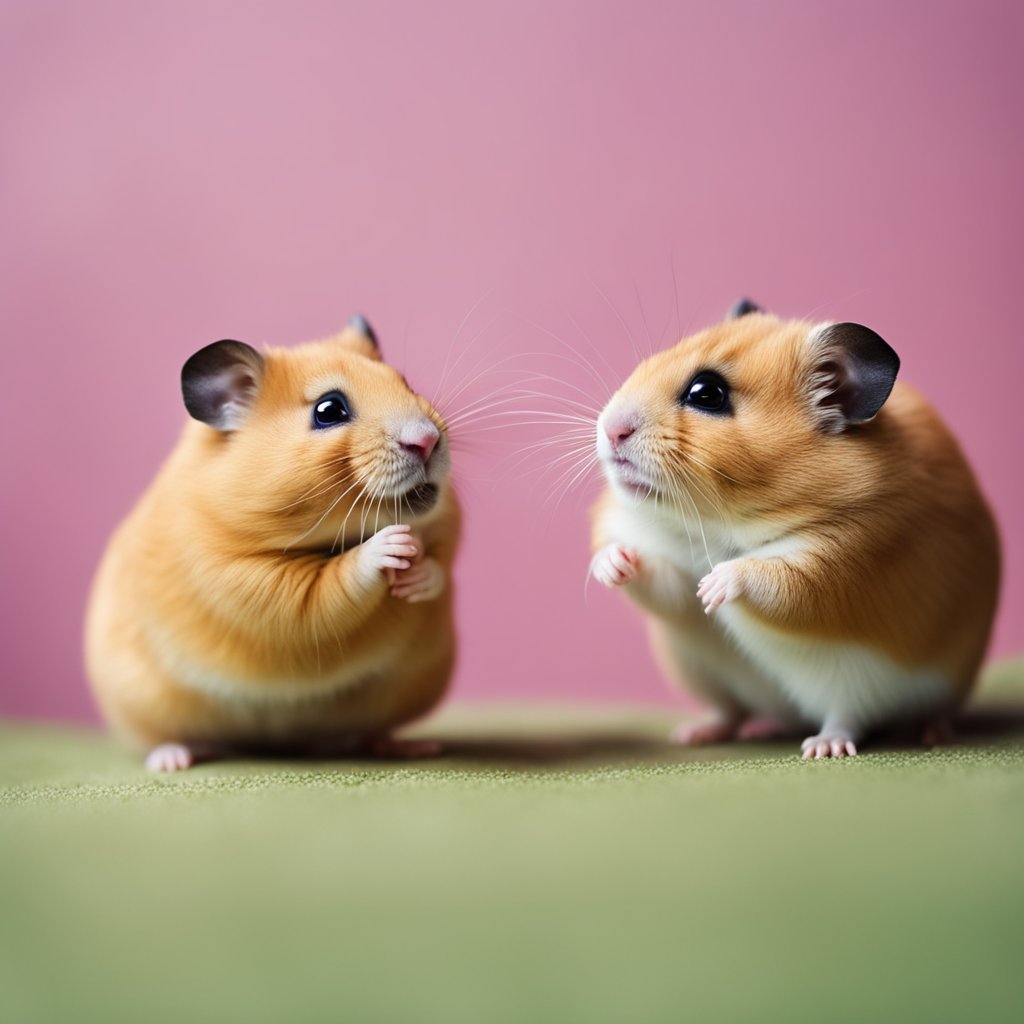What Hamsters Can’t Eat: A Comprehensive Guide to Safe Foods for Your Pet
Hamsters are adorable little creatures that make great pets for people of all ages. They are known for their playful nature, cute appearance, and relatively low maintenance needs. However, when it comes to feeding your furry little friend, it is important to know what foods are safe and what foods to avoid. In this article, we will take a look at what hamsters can’t eat and provide you with some tips on how to keep your pet healthy and happy.
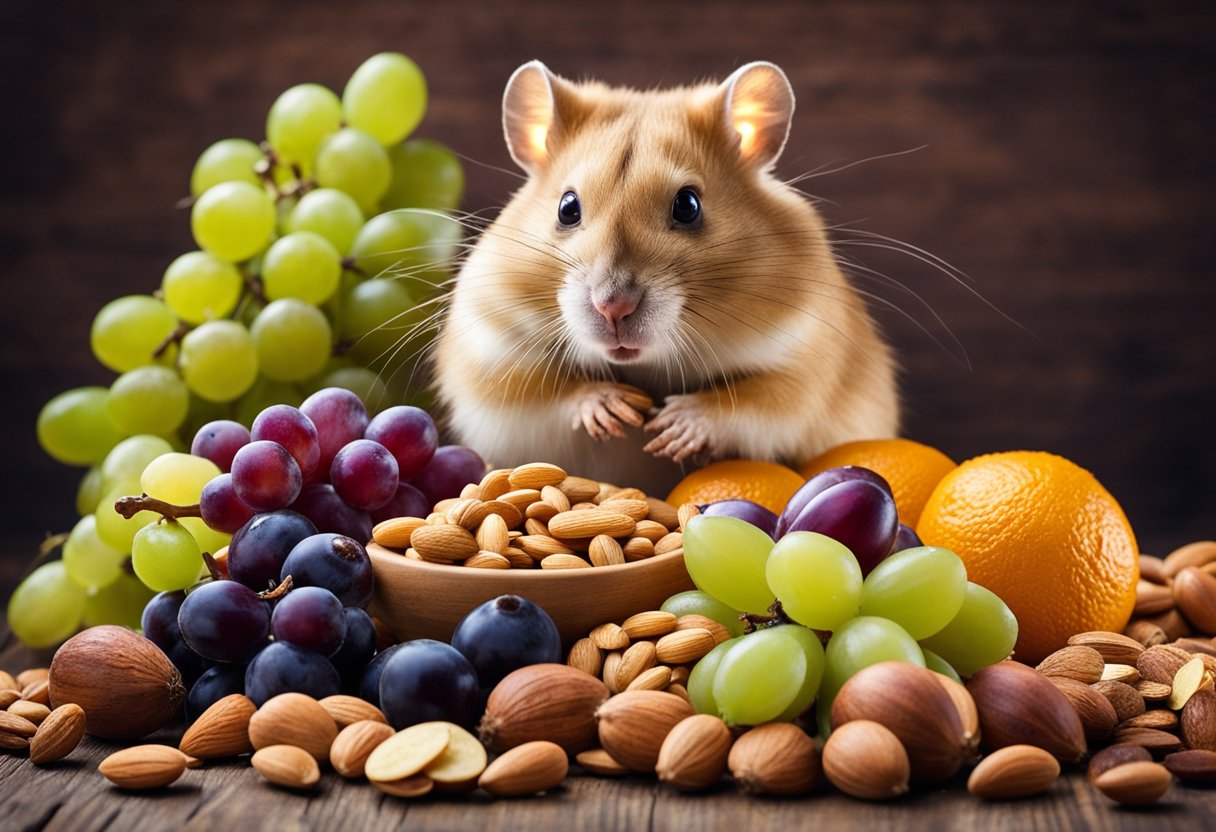
There are certain foods that can be harmful or even toxic to hamsters. For example, citrus fruits, onions, garlic, and chocolate should be avoided as they can cause digestive problems, anemia, or even death. Other foods to avoid include raw beans, apple seeds, and almonds. While some of these foods may be safe for humans, they can be dangerous for hamsters and should be avoided at all costs.
When feeding your hamster, it is important to follow safe feeding practices. This includes providing fresh water at all times, feeding your hamster a balanced diet, and avoiding overfeeding. In addition, you should always wash your hands before handling your hamster or its food to prevent the spread of germs. By following these simple tips, you can help ensure that your hamster stays healthy and happy for years to come.
Key Takeaways
- Certain foods can be harmful or toxic to hamsters, including citrus fruits, onions, garlic, and chocolate.
- Safe feeding practices include providing fresh water, a balanced diet, and avoiding overfeeding.
- Always wash your hands before handling your hamster or its food to prevent the spread of germs.
Foods to Avoid for Hamsters
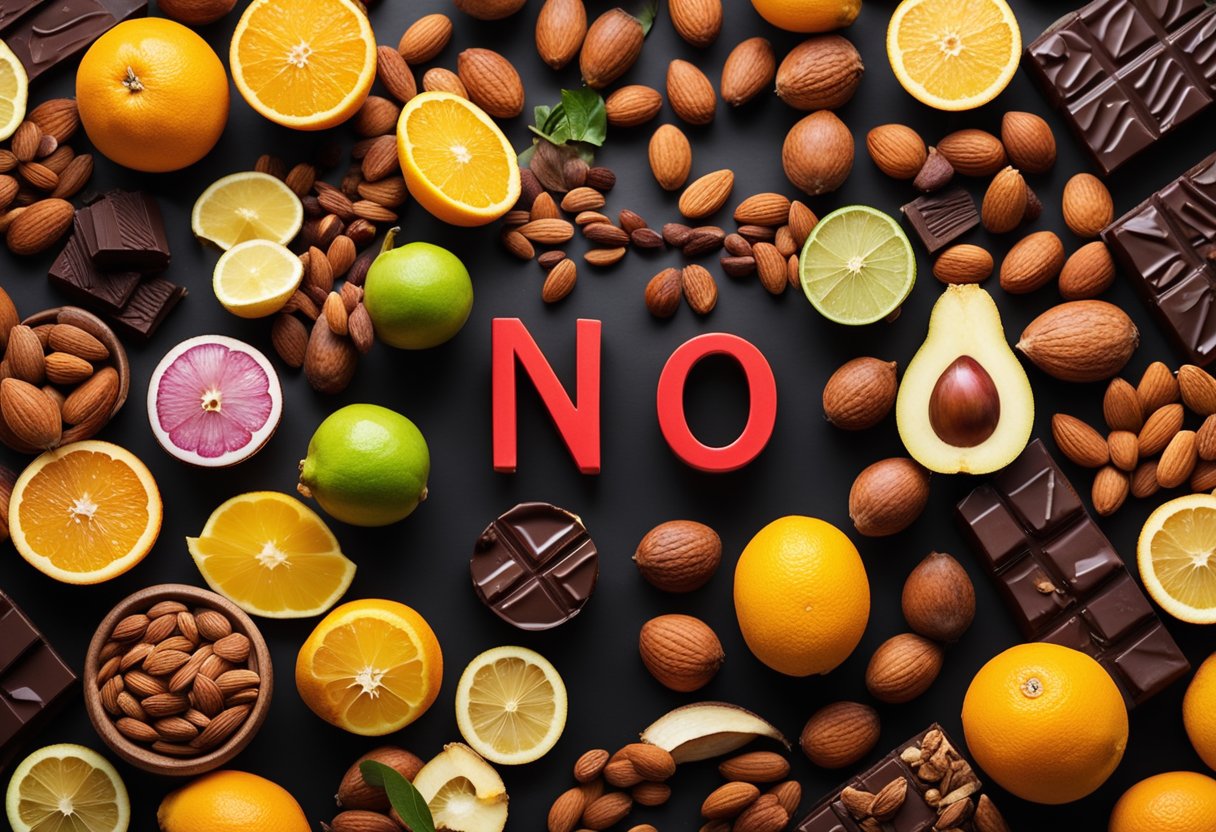
Hamsters are cute and playful pets that require a balanced diet to stay healthy. While they can eat a variety of foods, there are some foods that you should avoid feeding them. In this section, we will discuss some of the foods that are toxic, high in sugar and fat, and harmful plant materials for hamsters.
Toxic Foods
Some foods that are safe for humans can be toxic to hamsters. These foods can cause digestive problems, blood disorders, and even death. Here are some of the foods that you should avoid feeding your hamster:
| Food | Why to Avoid |
|---|---|
| Onions, garlic, and chives | Can damage red blood cells, resulting in anemia and gastroenteritis. |
| Chocolate | Contains theobromine, which can cause heart problems, seizures, and death. |
| Citrus fruits | Too acidic for hamsters and can cause digestive problems. |
| Avocado | Contains persin, which can cause heart problems and respiratory distress. |
High Sugar and Fat Foods
Hamsters have a high metabolism, but they are prone to obesity and diabetes if they consume too many high sugar and fat foods. Here are some of the foods that you should limit or avoid feeding your hamster:
- Candy, chocolate, and other sugary treats
- Nuts and seeds (in excess)
- Peanut butter (in excess)
- Cheese and other dairy products (in excess)
Harmful Plant Materials
Hamsters are herbivores and enjoy eating plants, but some plant materials can be harmful to them. Here are some of the plant materials that you should avoid feeding your hamster:
- Rhubarb leaves
- Tomato leaves and stems
- Potato leaves and stems
- Daffodil bulbs
- Ivy
- Yew
- Hemlock
Remember that a balanced and varied diet is key to keeping your hamster healthy. If you are unsure about a particular food, it is always best to consult with a veterinarian before feeding it to your hamster.
Safe Feeding Practices
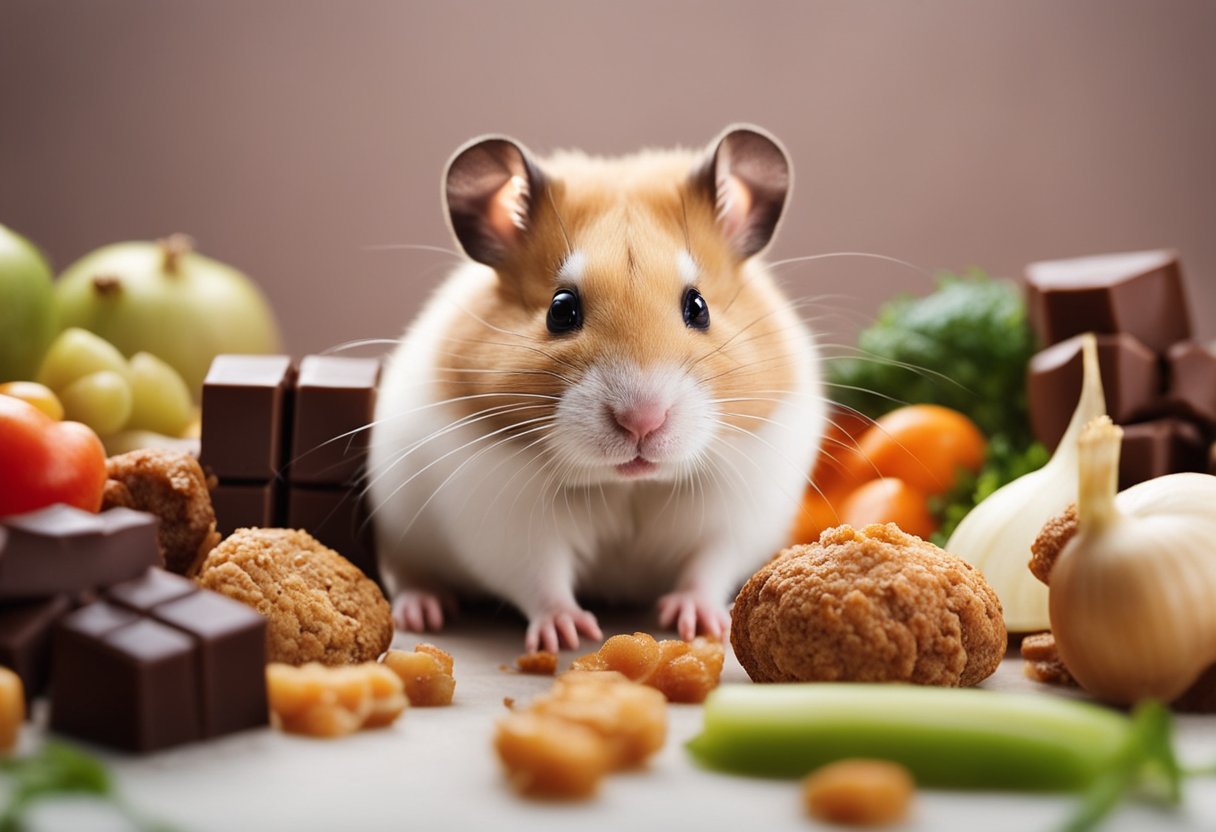
When it comes to feeding your hamster, it’s important to keep in mind that they have a sensitive digestive system. While there are many foods that are safe for hamsters to eat, there are also some that can be harmful to their health. Here are some safe feeding practices to keep in mind:
Stick to a Balanced Diet
Your hamster’s diet should consist of a balanced mix of commercial hamster food, fresh vegetables, and occasional treats. Make sure to choose a high-quality commercial food that is specifically formulated for hamsters and provides all the necessary nutrients. You can supplement their diet with fresh vegetables such as carrots, broccoli, and spinach. Avoid feeding your hamster too many sugary or fatty treats, as this can lead to health problems.
Offer Small Portions
Hamsters have small stomachs, so it’s important to offer them small portions of food throughout the day. This can help prevent overeating and obesity. A good rule of thumb is to offer your hamster a teaspoon of food per day, divided into two or three meals.
Avoid Certain Foods
There are some foods that are toxic to hamsters and should be avoided at all costs. These include onions, garlic, chocolate, and anything high in salt or sugar. Raw potatoes and uncooked beans can also be harmful to your hamster’s health. If you’re unsure about feeding a particular food to your hamster, always consult with your veterinarian.
Provide Fresh Water
Make sure your hamster always has access to fresh, clean water. You can provide water in a water bottle or a shallow dish. Change the water daily to prevent bacteria growth.
By following these safe feeding practices, you can help ensure your hamster stays healthy and happy.
Resources
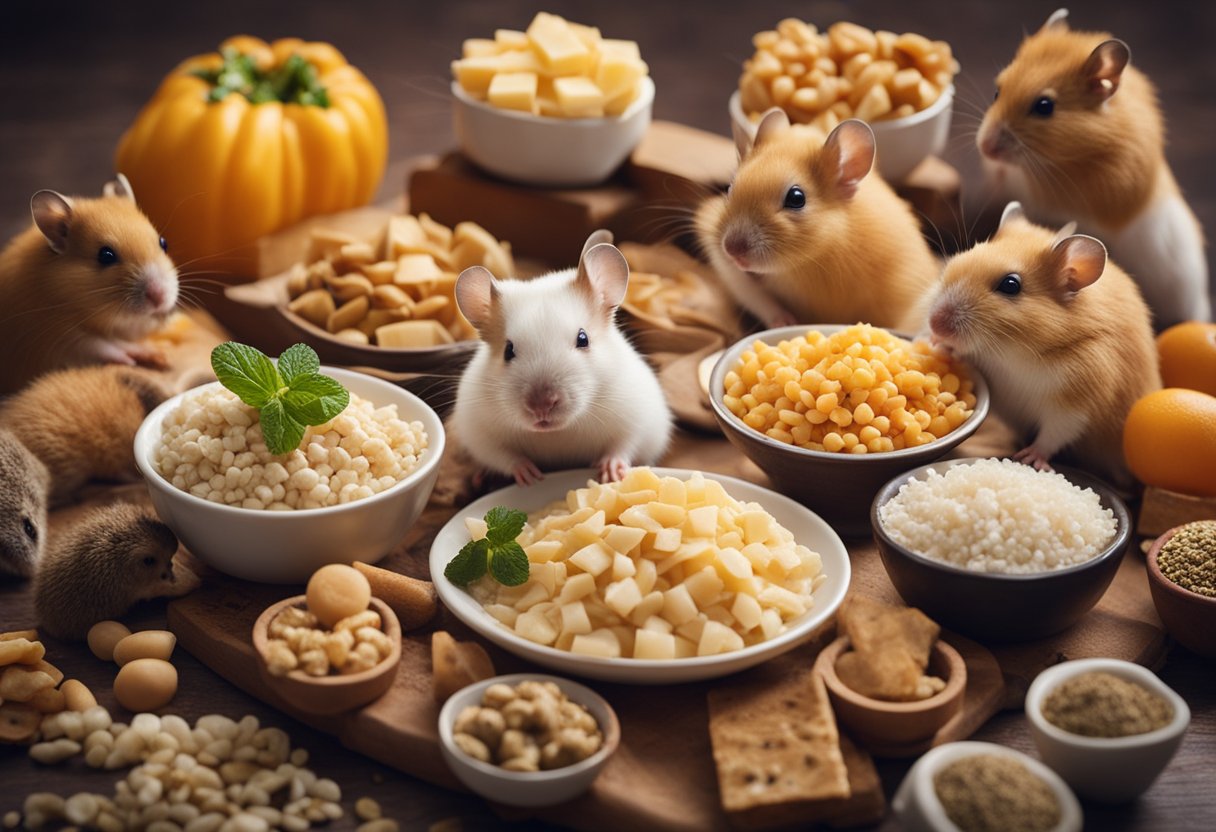
When it comes to feeding your hamster, it’s important to know what foods to avoid. Some foods can be toxic to hamsters and can cause serious health problems. Here are some resources that can help you determine what hamsters can’t eat.
1. Hamster Food Guides
There are many guides available online that list foods that hamsters can and can’t eat. These guides can be a helpful resource when you’re trying to figure out what to feed your hamster. One such guide is available at Hamster Geek, which provides a checklist of foods that hamsters should avoid. Another guide can be found at Easy Way Pets, which offers a comprehensive list of foods that hamsters should avoid.
2. Veterinarian Advice
If you’re unsure about what to feed your hamster, or if you suspect that your hamster has eaten something it shouldn’t have, it’s always a good idea to consult with a veterinarian. A vet can provide you with expert advice on what to feed your hamster and can help you identify any potential health problems that may be caused by certain foods. You can find a veterinarian near you by searching on AVMA.
3. Hamster Forums
Hamster forums can be a great resource for new hamster owners. These forums are full of experienced hamster owners who can offer advice on what to feed your hamster and what to avoid. You can find a variety of hamster forums online, such as Hamster Central and The Hamster Hideout.
By utilizing these resources, you can ensure that you’re feeding your hamster a healthy and safe diet. Remember to always do your research and consult with a veterinarian if you’re unsure about what to feed your hamster.
Conclusion
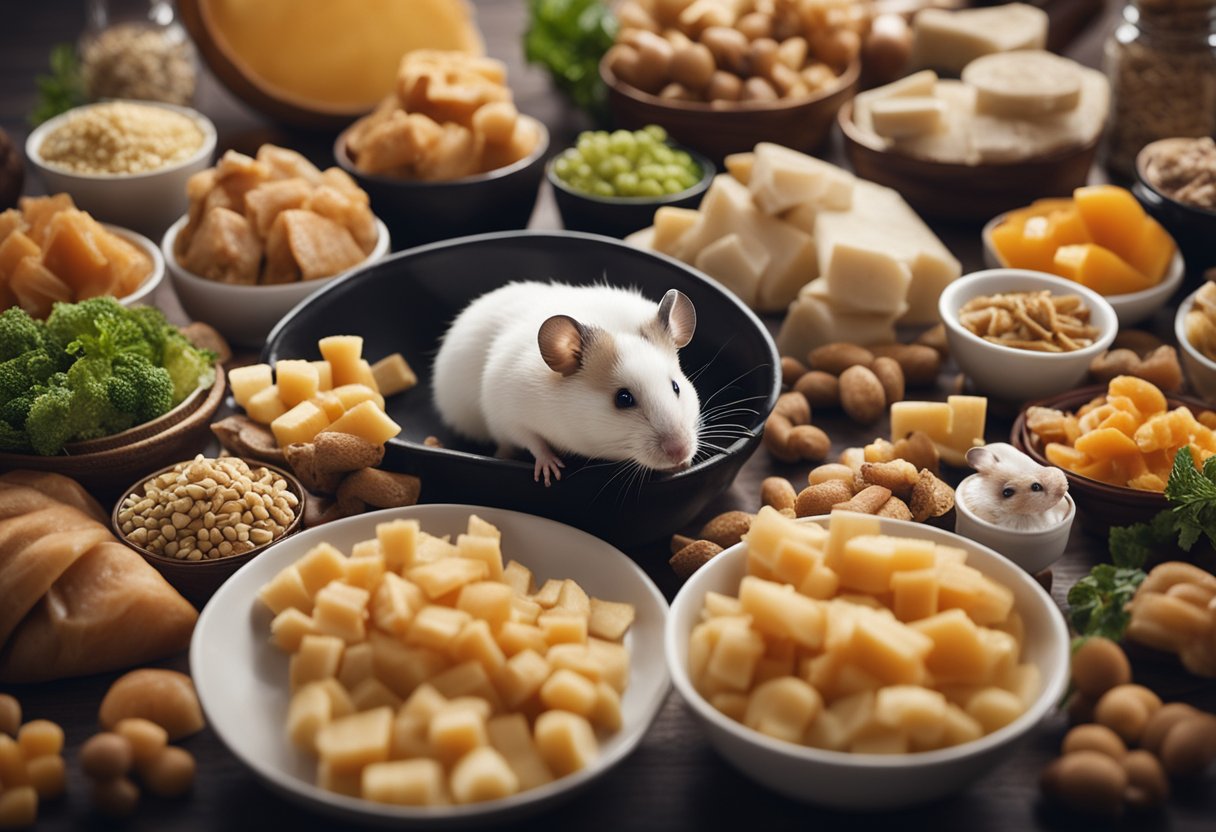
In conclusion, it is important to be mindful of what you feed your hamster. While these small pets can eat a variety of foods, there are many foods that can be harmful to their health.
To ensure your hamster stays healthy and happy, avoid feeding them foods that are high in sugar, salt, or fat. Additionally, steer clear of foods that are toxic to hamsters, such as raw potatoes and fruit seeds.
Instead, opt for a balanced diet that includes a variety of fresh fruits and vegetables, as well as high-quality hamster food. Make sure to always provide your hamster with fresh, clean water and monitor their eating habits to ensure they are getting the nutrients they need.
By following these guidelines and being mindful of what you feed your hamster, you can help ensure that your furry friend stays healthy and happy for years to come.
Frequently Asked Questions
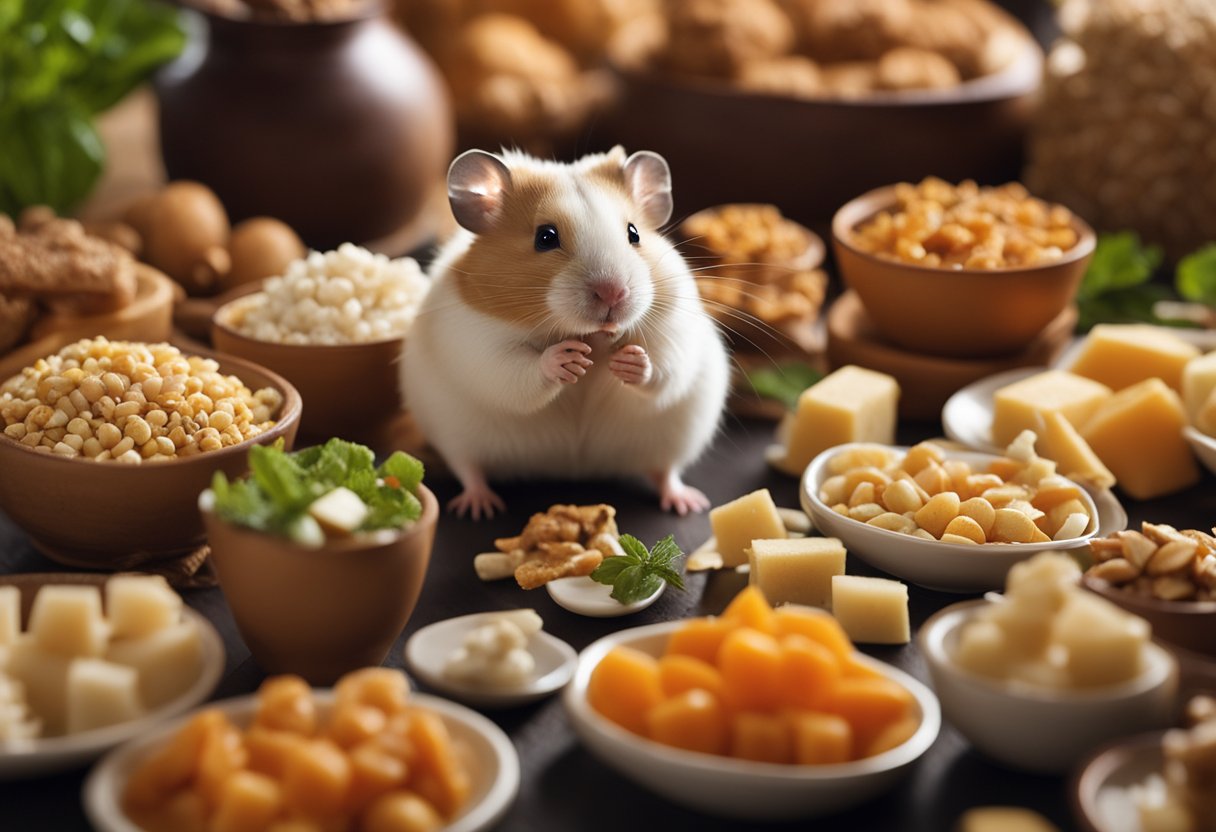
Which foods are toxic to hamsters?
Hamsters are sensitive to certain foods that can be toxic to them. Some of the foods that are toxic to hamsters include garlic, onions, almonds, raw potatoes, chocolate, and anything high in salt or sugar. These foods can cause digestive problems, anemia, and even death in some cases.
Are there any fruits that hamsters should avoid?
While fruits are generally considered healthy for hamsters, there are a few that should be avoided. Fruits that are high in sugar, such as grapes and raisins, can cause digestive problems and even kidney failure in some cases. Citrus fruits like oranges and lemons should also be avoided as they can cause mouth sores and upset stomachs.
What are the unsafe food items for hamster consumption?
Apart from the toxic and high-sugar fruits mentioned above, there are other food items that should be avoided in a hamster’s diet. These include dairy products like cheese, processed foods, and canned foods that are high in salt and chemicals. Raw beans also contain toxins that can be harmful to hamsters.
Is it safe for hamsters to eat dairy products like cheese?
Dairy products like cheese can be difficult for hamsters to digest and can cause digestive problems. It is best to avoid feeding dairy products to hamsters and stick to their regular diet of fresh fruits, vegetables, and grains.
Can feeding bread to hamsters cause health issues?
Feeding bread to hamsters in moderation is generally safe, but it should not be a regular part of their diet. Bread is high in carbohydrates and low in nutritional value, which can lead to weight gain and other health issues in hamsters.
Should hamsters be given meat in their diet?
Hamsters are omnivores and can eat small amounts of cooked meat, such as chicken or turkey. However, meat should not be a regular part of their diet as they primarily rely on fresh fruits, vegetables, and grains for their nutritional needs. It is important to ensure that any meat given to hamsters is cooked thoroughly and free from bones.
